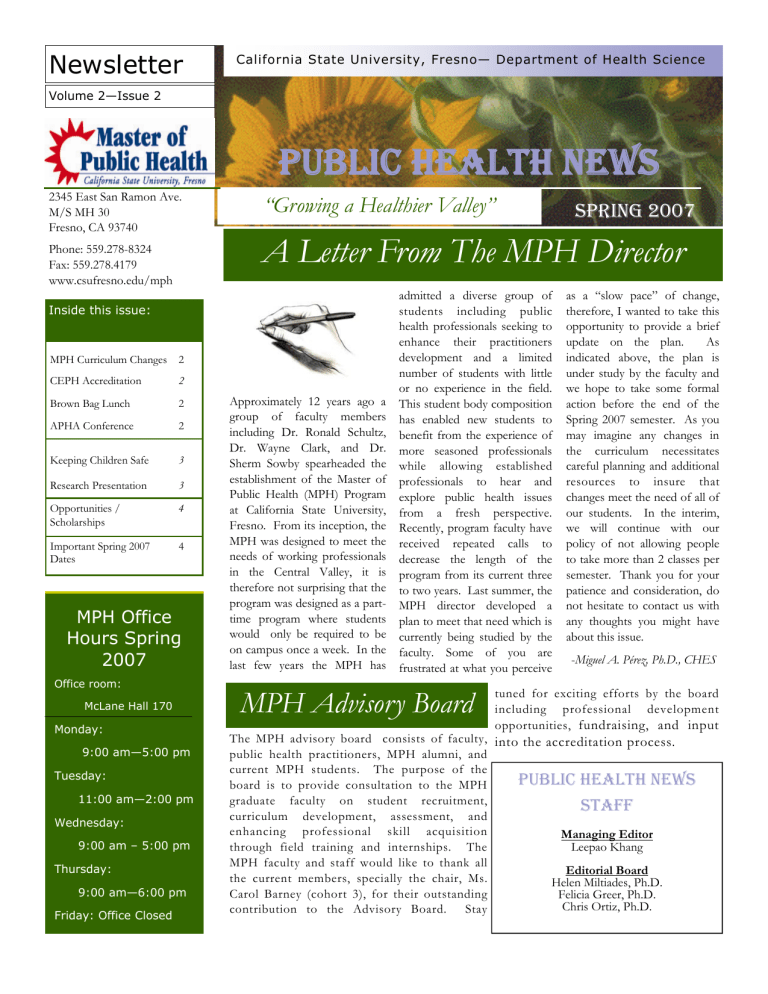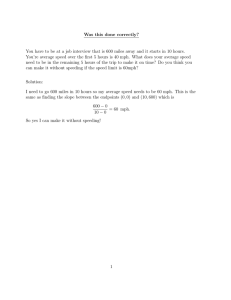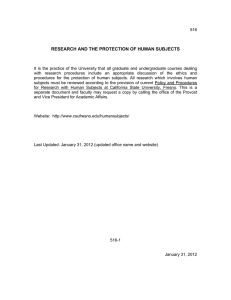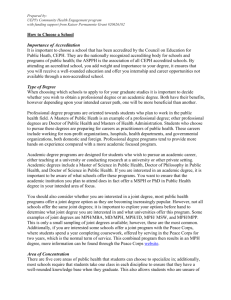PUBLIC HEALTH NEWS

Newsletter
Volume 2—Issue 2
California State University, Fresno— Department of Health Science
2345 East San Ramon Ave.
M/S MH 30
Fresno, CA 93740
Phone: 559.278-8324
Fax: 559.278.4179 www.csufresno.edu/mph
Inside this issue:
MPH Curriculum Changes 2
CEPH Accreditation 2
Brown Bag Lunch
APHA Conference
Keeping Children Safe 3
2
2
Research Presentation
Opportunities /
Scholarships
Important Spring 2007
Dates
3
4
4
MPH Office
Hours Spring
2007
Office room:
McLane Hall 170
Monday:
9:00 am—5:00 pm
Tuesday:
11:00 am—2:00 pm
Wednesday:
9:00 am – 5:00 pm
Thursday:
9:00 am—6:00 pm
Friday: Office Closed
PUBLIC HEALTH NEWS
“Growing a Healthier Valley”
SPRING 2007
A Letter From The MPH Director
admitted a diverse group of as a “slow pace” of change, students including public health professionals seeking to therefore, I wanted to take this opportunity to provide a brief enhance their practitioners development and a limited update on the plan. As indicated above, the plan is number of students with little under study by the faculty and
Approximately 12 years ago a group of faculty members or no experience in the field.
This student body composition has enabled new students to including Dr. Ronald Schultz, benefit from the experience of
Dr. Wayne Clark, and Dr. more seasoned professionals
Sherm Sowby spearheaded the while allowing established establishment of the Master of professionals to hear and
Public Health (MPH) Program explore public health issues at California State University, from a fresh perspective. our students. In the interim,
Fresno. From its inception, the
Recently, program faculty have we hope to take some formal action before the end of the
Spring 2007 semester. As you may imagine any changes in the curriculum necessitates careful planning and additional resources to insure that changes meet the need of all of
MPH was designed to meet the received repeated calls to we will continue with our needs of working professionals decrease the length of the policy of not allowing people in the Central Valley, it is program from its current three to take more than 2 classes per therefore not surprising that the to two years. Last summer, the semester. Thank you for your program was designed as a partMPH director developed a patience and consideration, do time program where students plan to meet that need which is not hesitate to contact us with would only be required to be currently being studied by the any thoughts you might have on campus once a week. In the faculty. Some of you are about this issue. last few years the MPH has frustrated at what you perceive
Miguel A. Pérez, Ph.D., CHES
MPH Advisory Board
The MPH advisory board consists of faculty, public health practitioners, MPH alumni, and current MPH students. The purpose of the tuned for exciting efforts by the board
into the accreditation process.
board is to provide consultation to the MPH graduate faculty on student recruitment, curriculum development, assessment, and enhancing professional skill acquisition through field training and internships. The
MPH faculty and staff would like to thank all the current members, specially the chair, Ms.
Carol Barney (cohort 3), for their outstanding contribution to the Advisory Board. Stay including professional development opportunities,
fundraising, and input
PUBLIC HEALTH NEWS
STAFF
Managing Editor
Leepao Khang
Editorial Board
Helen Miltiades, Ph.D.
Felicia Greer, Ph.D.
Chris Ortiz, Ph.D.
P u b l i c H e a l t h N e w s V o l u m e 2 — I s s u e 2 P a g e 2
MPH Curriculum Changes
MPH NEWS
Preparation for the CEPH Accreditation
• PH 221—Health and Disease of the Body System was offered for the last time during the Fall 2006 semester.
Health Promotion students need to visit with Dr. Perez to discuss a substitute class.
•
PH 225— Foundations in Health Promotion has been modified from a one semester course to a two semester course (PH 225A & PH 225B).
• PH 223T, a new one unit course will be introduced and required for all students beginning Fall 2007. This course is necessary to comply with the Council on Education for
Public Health (CEPH), which requires that all MPH programs be a minimum of 42 units.
Spring 2007 marks the beginning of a year long process to renew the
MPH’s accreditation from the Council on Education of Public Health
(CEPH), this 18 month process will include a site visit during the
Spring 08 semester. The accreditation happens once every 5 years and requires that the school or program undertake a self-evaluation, submit a self-study document, and host a team of qualified peer reviews who validate the self-study during an on-site visit to the campus. The MPH Office is pleased to have Laura Rodriguez, a MPH student, as a team member working on the self-study portion of the accreditation.
MPH Polo Shirt
APHA Student Updates
The MPH office had received many requests for making the MPH polo shirt available for purchase. Here is your chance to purchase your own MPH polo shirt and wear it proudly anywhere you go. If you are interested in purchasing an
MPH polo shirt, please contact the MPH office at 559.278.8324. Price of the shirt will depend on how many people order the shirt, however, it is estimated to be about $28.00.
Student Spotlight
Maribel Fernandez received a $2,000 scholarship from the Strawberry
Commission to further support her study as a graduate student.
Kathleen M. Cagle and her colleagues published an article titled “Results of a
Focused Scald Prevention Program” in the Nov/Dec issue of “The Journal of
B u r n C a r e a n d R e s e a r c h . ”
Leepao Khang received a travel grant from the Division of Graduate studies to present a paper at the 19th International
Union on Health Promotion and
Education (IUHPE) in Vancouver, BC.
Brown Bag Lunch
On Monday, April 23, 2007, the MPH
Office will host its second Brown Bag
Lunch event. This is the opportunity for students and faculty to meet, answer questions, and discuss different opportunities offered in the MPH program. Time & place: 12-1pm in
McLane Hall 193
Two MPH students, Alicia Gonzalez (cohort 13) and Maria Heras (cohort 12), received the
MPH travel award to attend the 134th annual American Public Health Association (APHA) conference in Boston, MA from November 4-8, 2006. This is the biggest public Health conference in the nation and happens once a year. Maria Heras (Cohort 12) stated, “To say that attending the 2006 APHA Annual meeting had a profound impact on my academic and professional life would be an understatement. The conference was empowering because it gave me a glimpse of just how the work that I do at the local level benefits public health at the national and even global level. I have been fortunate enough to work in areas like teen pregnancy and HIV/AIDS education at the community based organization (CBO) level.
Not only did the APHA meeting have in depth academic presentation of these subjects, but it also detailed how data was drawn from CBOs, just like the ones in which I have worked, to support their findings. Furthermore, these research projects are often used to model successful programs, sway legislation, and secure public health funding. It is often very difficult to see the fruit of your labor when you are battling in the CBO trenches. The APHA served as a rejuvenating retreat that inspired me to trudge forward in my academic career and made me excited about entering the professional world of public health. It also exposed me to the multifaceted arenas of public health in which I can look forward to exploring. I cannot thank the
MPH program enough for the inspiring opportunity.”
The MPH program is pleased to support student development. Congratulation to Alicia and Maria. Photo courtesy of Maria
Tommie Clark-Davis, (cohort 11) attended the brown bag lunch last semester and this is what she had to said, “I had the privilege to attend the roundtable brown bag session with
Karen Kitchen (cohort 1) on November 13, 2006 where she shared her valuable experience as Senior Health Promotion Consultant for Blue Cross of California. Mrs. Kitchen collaborates with community organizations such as the American Lung Association,
American Heart Association and the American Cancer Society educating communities as well as individuals to live healthy lives. She is also very active in the advancement of public health as she volunteers to work as a preceptor providing supervision and meaningful opportunities through internships for current undergraduate and graduate students. At Blue
Cross you will get the opportunity to be part of the team, treated as any other member. If you have not fulfilled your fieldwork requirement, Blue Cross under the leadership of Karen
Kitchen would be a great place to gain some valuable experience. Very inspirational, wish all of you could have attended.” Look forward to seeing you at the next meeting.
P u b l i c H e a l t h N e w s V o l u m e 2 — I s s u e 2 P a g e 3
STUDENT WRITING
Keeping Children Safe
According to the Centers for Disease
Control and Prevention, unintentional injury is the leading cause of death for people living in the United States between the ages of one and 34. Unintentional injuries are commonly referred to as “accidents,” although they are anything but accidental.
Most injuries have predictable patterns and can be prevented through a change in human behavior or by environmental modifications. Childhood injuries are especially devastating because young children are not developmentally able to protect themselves from injury.
Additionally, if they sustain a serious debilitating injury early on, they lose many years of productive, quality life. The cost of medical care for injuries is very expensive, and the loss that the family experiences is immeasurable.
Some of the leading causes of childhood unintentional injury are: motor vehicle crashes, drowning, falls, burns, and pedestrian injuries. In Fresno and Madera
Counties, there are many agencies that are working to reduce childhood deaths and injuries from these unintended causes. Most of these agencies collaborate via two
The Water Safety Council of Fresno County was founded in 1993. They work to educate the community about risk factors and prevention of drowning and near-drowning injuries. Members include Children’s
H o s p i t a l
C e n t r a l
C a l i f o r n i a , visit www.watersafe.org
. coalitions. University Medical Center’s
Trauma Division is the lead agency for
Safe Kids Central Valley. The coalition was initially founded as a chapter of the
California State Safe Kids in 2001, and their target area is Fresno and Madera
Counties. Members include: Fresno and
Madera Departments of Community
Clovis Fire
Department,
F r e s n o
C o u n t y
Department of Community
Health, U.S.
Army Corps of Engineers, and the Fresno County Flood
Control District. The council has been able to provide free swim lessons to low-income children over the past two summers. They employ water safety educators who “patrol” popular swimming areas along lakes and rivers in the summer months, educating families. The also provide educational classes to parents and adult caregivers, distributing
“Water Watchers” kits. For more information about the Water Safety Council’s activities or to get involved in their efforts, coalitions: Safe Kids Central Valley and The
Water Safety Council of Fresno County.
Many agencies participate in both collaboratives.
Safe Kids Central Valley is part of Safe Kids
Worldwide, and international non-profit organization that is dedicated to preventing childhood unintentional injury. In the United
States alone, there are more than 300
Departments, Children’s Hospital
Central California, California Highway
Patrol, Fresno and Clovis Fire
Departments, and other community based organizations and non-profit agencies. Safe Kids Central Valley has active committees that initiate prevention programs in the areas of child passenger safety, falls prevention, and burn prevention. Visit their website for information on current programs, links to member agencies, links to local and national injury prevention programs and a calendar of upcoming events, www.safekids-centralvalley.org
.
Written by: Kathleen Cagle, Cohort 11
This new feature allows MPH students to publish information. If you want to publish an article in the MPH newsletter, you can send us your articles to the managing editor Leepao Khang at leelee@csufresno.edu. You may see it
Research Presentation
The 21st Annual California
State University Student
Research Competition students currently enrolled at any
CSU campus, as well as alumni/ alumnae who received their
The 21st Annual California State
University Student Research
Competition will be held at
California State University, degrees in spring, summer, or fall
2006 may apply. Interested students should contact their c a m p u s c o o r d i n a t o r f o r
Dominguez Hills on May 4 and 5,
2007. The purpose of the competition is promote excellence in undergraduate and graduate scholarly research and creative a c t i v i t y b y r e c o g n i z i n g o u t s t a n d i n g s t u d e n t accomplishments throughout the
California State University. Both information on how to have their work considered at the campus level. Only those students e n d o r s e d b y a c a m p u s coordinator can enter the statewide competition. The deadline to submit your abstract is
Monday, March 12, 2007. If you need more information about the undergraduate and graduate research competition, contact
Doug Carey at 278-0856 or via email dcarey@csufresno.edu.
The 28th Annual Central
California Research
Symposium
The symposium will be held on
April 12, 2007 at the University
Business Center. The purpose of the symposium is to share recent research with the community in various field, college students, and faculty as well as to encourage more research activities in the
Central Valley. The deadline to submit abstract is March 19, 2007.
For more information, visit http://csufresno.edu/grants/ symposium.htm
Opportunities
Important Dates
Health
Promotion
Class in
Espanol
Do you work with Spanish speaking clients? Do you wish t o l e a r n t h e c o r r e c t terminology for the delivery of health promotion programs in
Spanish? Then this class is for you. Dr. Pinzon-Perez will offer a health promotion course from May 21 to June 8,
2007 through the Division of enhance their entrance into doctoral study. Summer internships are also available for selected scholars. Contact the division of graduate studies for more information. The deadline is March 29, 2007.
Chancellor’s
Doctoral
Incentive
Program
The Chancellor's Doctoral
G l o b a l a n d E x t e n d e d
Incentive Program (CDIP) provides financial assistance to
Education ENTIRELY IN
SPANISH AND ONLINE. graduate students who show promise of becoming strong
Student Jobs,
Internships, and Career
Development
Programs
Ready to put that hard earned education to use? Whether you are a high school student, in your freshman year in college, working on your doctorate, or somewhere in between, the
CDC have an opportunity for you. The student employment programs, internships, and career development programs guarantee valuable paid and
Graduate students seeking an elective for their degree program can use this class. For more information, please c a n d i d a t e s f o r C S U instructional faculty positions.
The purpose of the program is non-paid work experience.
Some of the opportunities are: contact Dr. Pinzon-Perez at hpinzonp@csufresno.edu.
* Emerging Leaders Program to increase the pool of i n d i v i d u a l s w i t h t h e
Fellows Program (PMF)
California Pre-
Doctoral
Program
qualifications, motivation, and skills to teach the diverse student body in the California
*Student Educational
State University. It is a
*Student Summer
Employment Program
This program is designed to increase the pool of potential competitive program directed faculty by supporting the University but open to doctoral students across the country. doctoral aspirations of
California State University
If you have questions about students who have experience economic and educational the CDIP please contact
Chuck Radke, Division of disadvantages. Scholars and their faculty mentors are
Graduate Studies, (559) 278-
2448 or cradke@csufresno.edu
Contact the CDC organization if you are interested in working to learn more about student employment opportunities or visit h t t p : / / w w w . c d c . g o v / employment/studentjobs.htm
awarded $3,000 to travel to doctoral institutions and national conferences to
January 17: First day to apply for a degree to be granted in
Spring 2007
February 2: Spring 2007
Graduation Application Period ends
February 9: Application for the
2007/2008 Chancellor’s Doctoral Incentive Program due
March 2: Last day for Summer and Fall 2007 graduates to file for Advancement to Candidacy
March 10 : Comprehensive Exam
March 19: Committee-approved final thesis final drafts due in the
Graduate Office for students graduating in the Spring 2007
March 30: Cesar Chavez Day,
Campus Closed
April 2-6: Spring Recess—Office
Closed
May 9: Last day of Instruction
May 16: Office closes for the summer
May 18: Master’s Degree Clearance Forms due in the Graduate
Office for spring graduates
May 18: Graduate Degree
Hooding Ceremony
Scholarships/Internships
May 19: 96th annual Commencement Ceremony
Summer Internship Program
Graduate Student Travel Grant
(SIP) at National Institute of
Graduate Student Research
Health
Merit Award www.training.nih.gov/
Graduate Equity Fellowship
Program Directors of Health
F o r t h e s e a n d o t h e r scholarships, please visit the
Promotion and Education/
CDC Internship division of graduate studies website. www.dhpe.org
D e p a r t m e n t
S c h o l a r s h i p s
The department of Health
Science has scholarship available to graduate students.
Contact Dr. Sherm Sowby at sherms@csufresno.edu for additional information.



